- Home
- Chris Pierson
Sacred Fire Page 2
Sacred Fire Read online
Page 2
“Don’t!” Varen cried, too late.
The crash of sword striking glass filled the room. A shard of the stuff broke off, clattering at Morias’s feet. It glinted in the lamplight, the color of sunrise. People would prize it, Varen realized as the sell-sword lifted it up. It was remarkably beautiful, and it existed nowhere else in the world. The riches, the fame he’d craved… it was all here, for the taking… .
“No,” he said, stepping back. “It’s grave robbery, We’d be selling these people’s tomb”
Morias shrugged, regarding the shard in his hand. “They don’t need so much of it. If we just take a little for now…” He stopped suddenly, his brow furrowing, and cocked an ear.
Varen heard it too. At first, he’d mistaken it for the clang of the mercenary’s sword hitting the glass, still echoing out in the street. It wasn’t getting any fainter, though—it was growing louder. And then there was a new sound, rising above it: a sharp, pained cry, and the clatter of an armored body hitting the ground.
“What in the Abyss?” Morias grunted, dropping the glass. It clinked on the floor without breaking. His men were already moving toward the doorway, and Varen started to follow, but Morias shoved the scholar aside, hurrying after. The clamor of steel outside grew, fiercer with every heartbeat.
A man stumbled into the room then, and the sell-swords nearly cut him down before they realized it was one of their own, a burly man who fought with twin shortswords. One of the blades was gone now, and his left arm below the elbow as well. Blood washed his armor. He had a second cut across his chin, and his eyes were wide with terror.
Morias caught him as he collapsed, eased him down. “What is it, man?” he demanded. “Speak!”
“It… it got them,” the mercenary said, staring wildly. “It killed them all!”
The other sell-swords started at this, looking at one another. Varen bit his lip. Five men dead, a sixth cruelly maimed—and the battle, from the sound of it, had lasted less than a minute. A terrible dread settled over him.
“Who?” Morias shook the injured man, who had slipped into incoherent shock. “Who did this?”
“Sharaz Qunai,” Varen moaned.
The mercenaries stared at him—but only for a moment. Then steel flashed in the doorway, and another of them fell, his head toppling from his shoulders. Blood fountained, and Varen caught a horrible glimpse of the surprise on the man’s face before he crumpled into the dust. The other sell-swords stumbled back, crying out in alarm, and something came after them.
The Staring Ghost had come.
“Fall together!” Morias bellowed, waving his blade at his men. He may as well have been trying to guide a flock of sparrows. They tripped over one another, stumbled into pillars, swung wildly at the air.
Varen gaped at the apparition as it swept through their midst, cutting down one man after another as though they were stalks of grain. It wasn’t a ghost at all, but an old man— wiry and sun-beaten, his head covered by a white cloth, his beard wild and silvery. He wore a flowing white robe, torn and smudged with use, and in his hand was a glittering blade that danced with expert grace.
Strangest about him, though, were his eyes. They were dead white, with neither iris nor pupil, not clouded like a blind man’s, but utterly empty. Varen could meet their stare only for an instant before looking away. It was a strange, awful sight … yet there was something familiar about those eyes, something that nagged at his memory.
Sharaz Qunai killed them all, one after another, and not a single grazing blow even touched him. He was a whirlwind of flashing, slashing steel: watching him fight, Varen understood why so few who set out to find Losarcum’s ruins had ever returned. How many greedy treasure-seekers had this man killed over the years?
Finally, only Morias remained. He fought bravely, coming on with swift savagery, his sword darting at the old man’s face. The Ghost parried the blow easily, but it stopped him in his tracks long enough for Morias to shove him back. The two of them fell away from each other and paused, sizing each other up, This was a more evenly matched contest, and both man knew it. The Ghost wasn’t even breathing hard, though nine men had already died by his blade.
When they fell to again, the clatter of their swords sounded like hail on a copper roof. They were both masters of the blade, and recognized each other as such, giving and taking ground with a rhythm that was as much dance as fight. Every swing was precise, every parry exactly where it needed to be. Each man saw the other’s faints, and knew when a riposte was coming. Eyes, throat, stomach, breast… quick or slow, every cut and thrust was a potential killing blow, had it landed. But for a long time, none of them did.
Time became meaningless in the clamor of steel. Varen watched as if he were a spectator at a gladiatorial epic. Finally, however, a thought came to him, breaking through the fascination to scream in his ear.
Run!
Startled, he glanced toward the manor’s entrance. It was empty, unblocked: the Ghost and Morias had circled away, leaving the dead mercenaries scattered on the ground. Thoughts of riches and glory fled Varen’s mind: his quest had failed. The only question left was whether he would live to see the sky again. With a choked cry, he stumbled toward the doorway.
The Ghost saw him, his head turning to follow the movement—a telling mistake. Laughing, Morias lunged, thrusting at the old man’s heart.
Steel met steel. It was an impossible parry, the kind of move masters-at-arms strove for years to perfect, and it deflected Morias’s blade scarcely an inch from the Ghost’s chest, but saved his life. He wasn’t spared from harm entirely. Instead of his vitals, Morias’s blade slid deep into the flesh of the old warrior’s thigh. The old man groaned, his knees buckling.
Then his sword came up hard, its tip punching through the flesh beneath Morias’s chin. The sell-sword’s helmet flew off as the blade came out the top of his skull, and he stood rigid, his eyes widening. He slumped to the floor. The Ghost jerked his sword free, then staggered and fell as well, one knee hitting the floor hard. He pressed his free hand to his wound, trying to stanch the blood.
Varen stared, paralyzed by shock. His eyes met the empty orbs of the Staring Ghost—and then, in a flash, he knew who this man had to be.
The Ghost grunted, started to rise. Half-mad with terror, Varen turned and fled, and never looked back.
Chapter 1
The Lordcity of Istar was drowning in roses.
They were everywhere, white and red and golden: draped in blankets from gleaming, white walls; hung in garlands from her alabaster towers and golden domes; gathered in bunches on lintels of doors; scattered about plazas and courtyards. Their petals carpeted the streets, drifted up against marble walls, floated on the surfaces of fountains and pools. Their attar ran as thick as smoke in the air, smothering the smells of spices and incense that ordinarily rose from the city.
Another Yule had come. The first festival of winter—a season of rain, rather than the snows that visited the realms to the west—was the grandest in the holy empire. Three days from now, the routines of the Lordcity would cease, and the citizens would give themselves over to drink and feasting in homes and wine-shops. The God’s Eyes, the twin silver lighthouses that guarded the mouth of the city’s port, would burn crimson instead of white, and the School of the Games in the eastern quarter would resound with the clash of steel and cheers of the crowds. In the west, at the crimson-turreted tower that had once belonged to the Orders of High Sorcery, folk would burn straw effigies dressed in robes of black and red and white, in defiance of the hated—and long departed—wizards. To the north, the Hammerhall, the sprawling fortress that was home to the knights of the Divine Hammer, would throw open its mighty doors and the empire’s defenders would parade into town in their mirror-bright armor.
And in the midst of the city, at the heart of the world where all Istar’s roads met, the Great Temple of the Kingpriest would resound with joyful music. Its crystal dome would shine as though a second sun had kindled within.
Thousands of worshipers, from all over the city, the empire, and the world beyond, would pack the Barigon, the huge, statue-ringed square that stood before the Temple, coming together to receive blessing from the Kingpriest himself. They had done so for thirty-seven years now, since Beldinas the Lightbringer came to the throne. Gods willing, they would continue to do so for years to come.
Today, however, life in the Lordcity went on as it always did. Mighty trading galleys and tiny fishing boats slid across the harbor and glistening lake beyond, a riot of bright sails billowing on then masts. Folk clad in robes of satin and velvet bustled through the sheets, or stood in clusters is in the plazas and gardens, talking and laughing and arguing. The markets swarmed with color and noise as merchants sold everything from Tarsian rugs to unguents from Karthay, pearls and ivory from Seldjuk, jugs of fine Taoli wine, even shards of old wood said to date from the lance of Huma Dragonbane himself. The Scatas, the blue-cloaked soldiers who were the backbone of Istar s armies, marched on patrol, led by white-coated knights on horseback. Priests and monks made processionals among the city’s many shrines, chanting hymns of the Kingpriest’s mercy and glory. Pilgrims from all over Krynn prostrated themselves before the Temple’s steps, chanting over and over:
Beldinas Cilenfo … Beldinas Pilofiro … Beldinas Babo Sod …
Beldinas the Healer. Beldinas the Lightbringer. Beldinas, the true Kingpriest.
On the highest balcony of his towering manse, overlooking the mist shrouded gardens of the Temple, the Kingpriest stood, listening to the chorus murmuring his name. Thirty-eight years ago, he had come to Istar for the first time. Mere months before, he had been known to only a close circle as Brother Beldyn, a monk of scarcely seventeen summers, yet one who could work miracles of healing with his touch. Then lady Ilista, high priestess of Paladine, had visited his abbey, led by divine visions to find him. His coming to Istar had brought a schism within the empire, and caused Ilista’s own death; near open war had ended with the downfall of Kingpriest Kurnos, now called the Deceiver, who had used the darkest of magics in a mad attempt to hold on to his throne. The people of Istar had rejoiced when, wearing the long-lost Crown of Power, Beldinas had taken the throne. They had begun to chant his name that glorious day.
Thirty eight years, and the people still hadn’t stopped. For more than two thirds of his life, it had been the first thing he heard when he woke in the morning, and the last before he fell asleep. Even when he left the Lordcity, and went on processionals throughout the empire’s provinces—to the deserts of the south or the jungles of the north, the ports of the east or the highlands of the west—the admirers and chanting followed him. Hearing it now, he leaned forward, setting his hands on the balcony’s platinum balustrade, and let out a weary sigh.
“Holiness ”’ asked a voice behind him—soft, solicitous, polite. “Is something wrong?”
Beldinas turned, though he didn’t need to. That voice had been a constant in his life all these thirty-eight years. Other disciples had come and gone, friend and foe, counselor and courtier, but Quarath had always been there close by his side. Though his official title was Emissary of the Silvanesti elves, he had become much more. He was the Kingpriest’s most trusted advisor, and nearly as vital to the empire as Beldinas himself. Nothing happened without the elf knowing it: if Beldinas was Istar’s beating heart, Quarath was its sleepless brain.
The elf’s face—still youthful, unchanged even after so many years—was set in a frown of concern. A delicate hand rose to push back an errant strand of honey-colored hair. Quarath’s silvery robes, embroidered with gold and emeralds, shimmered with the movement.
“You seem tired, Aulforo,” he said. “Did you sleep poorly?” Beldinas hesitated. “No, Emissary. I am rested. No ill dreams troubled me.”
Quarath nodded. As far as he or anyone else knew, the Kingpriest did not dream at all, good or ill. It drove the imperial soothsayers mad. “What is the matter, then?” the elf asked. “Do not tell me it is nothing.”
“I wouldn’t think to,” the Kingpriest said with a smile so slight it was barely noticeable. “You know my mind as well as I do. Perhaps better—so you tell me, Emissary. Look, and tell me what troubles me.”
The elf made a show of studying Beldinas, his brow furrowed with concentration. A silver lizard—bred, by means since forgotten, to resemble a winged dragon—flew up from the gardens below, inspected the both of them, then swooped away when it determined neither was about to give it food. When it was gone, Quarath raised his eyebrows, pretending to understand only now.
“It is the war,” Quarath said sympathetically. “You worry over the struggle against darkness.”
Beldinas shrugged. “What else? I have been fighting to drive evil from the world most of my years, and I fear I will not live to see victory.”
“Don’t say that, Holiness,” Quarath said. “You’ve accomplished a great deal. The Divine Hammer have rooted out the last of the evil gods’ worshipers. The goblins and ogres are gone too, and the wizards—” both paused to touch their foreheads as a ward against sorcery “—are exiled, and will not return.”
“I know, Emissary,” assented Beldinas. “It is all I hoped for when I first donned the crown … but it isn’t enough. Evil is beaten, but it is not destroyed. Even now, the knights still find forbidden cults in the wilderness.”
Quarath couldn’t help but acknowledge the point with a grim nod. Just yesterday, the court had been stunned to learn that the Divine Hammer had rooted out a hidden sect in Falthana, one which secretly worshiped a many-armed god. The cultists had fought back, but the forces of light had prevailed, smashing the false deity’s idol. They had brought the pieces back to Istar as a trophies.
“Evil abides, Quarath,” Beldinas declared, and sighed again. “No matter how ruthlessly we strike at it, it will not die. It only appears somewhere else, because there is one place it hides where I cannot reach. The hearts of men.”
The elf looked toward the basilica, shining brilliantly in the morning light. “It will be … difficult… rooting it out from men’s hearts, Holiness,” he ventured. “The gods made my people for good, just as they made the ogres and their like for evil. But they gave men both, to choose between them. So it is written.”
“I know that,” the Kingpriest replied somewhat acidly. “I have read the holy scriptures, you know. Even so, I must seek a way.”
“But how?”
“I don’t know,” Beldinas said, turning back to look out over the garden. “At least not yet, Quarath.”
The elf’s eyes narrowed. He bit his lip, uncertain how to reply. Luckily, he didn’t have to fret long. As he gazed at the Kingpriest’s back, he heard the sound of footstep; jeweled slippers whispering across the marble floor. Proud as always that his keen elven senses had picked out the noise before Beldinas could hear, he turned to peer through the archway leading back into the manse.
Within was a young woman, not quite thirty, with long hair like polished brass. She dressed in white robes fringed with violet, an amethyst circlet on her head. “Efisa,” Quarath said in a low voice as she drew near. “What brings you here, away from your order?”
Lady Elsa, First Daughter and highest priestess in the Istaran church, clasped her hands in greeting, bringing her thumbs together to form the god’s triangle. “I apologize for the interruption, Emissary, but I bring tidings from First Son Revando.”
“You can tell me, Elsa,” Quarath said. “The Kingpriest should not be disturbed.”
“Nonsense, Emissary,” interrupted Beldinas, coming up behind Quarath. “If the First Son and Daughter both feel it is important, then it must be so. Speak, Efisa.”
Elsa dipped her knee toward the floor as the Kingpriest drew near. “Holiness,” she said, “Revando and I were at the front gates of the Temple, performing the morning benediction over the pilgrims, when I chanced to look toward the harbor. There was a commotion there, and then I saw … I saw a ship.”
One of Quarath’s eyebrows c
limbed. “A ship, you say? In the harbor?”
“Don’t be sarcastic, Emissary,” Beldinas said to Quarath, an edge in his voice. He turned back to Elsa, whose face had turned red. “What of this ship? Tell me, child.”
Elsa regained her composure, smiling gratefully at the Kingpriest. “The ship, Holiness … it had an unusual sail.”
She trailed off as Beldinas studied her a moment, intently. Then his back straightened, and he took half a step back. “Gray,” he said. “The sails were gray, weren’t they?”
She looked at him in surprise. “Y-yes, sire. They were. Are.”
Quarath shot the Kingpriest a sharp glance. “Gray! What is she doing here?” he asked.
“I don’t know, Emissary,” Beldinas replied, frowning. “But we shall soon find out, I think. Lady Elsa, you did well, coming here. Now I need you to spread the news. Go to the Hammerhall, and tell the Grand Marshal to come here at once.”
“Of course, Holiness,” said the First Daughter. “What should I say?”
“The truth,” the Kingpriest said, and sighed for the third time that morning. “Tell him the Weeping Lady has come.”
*****
The Grand Marshal ducked, and just in time he heard the whistle as the sword missed his head, and knew he was lucky it hadn’t caught him full in the face. A lesser warrior never would have seen the blow coming, nor recovered fast enough to launch a counterattack before his foe could capitalize on catching him off-balance—but the Marshal had been a knight of the Divine Hammer for nineteen years, and its leader for seven. There were few better swordsmen in the world.
Smiling behind his visor, he spun to his left, rising to full height once more and bashing his opponent’s weapon arm with his shield. The other knight—a hotheaded youth named Bron—grunted more with pain than surprise, and stumbled sideways, his sword dropping. Instinct took over, focusing on the momentary vulnerability, and the Marshal swung at Bron’s head.
Bron was an untested fighter, but he was also quick. His blade came up again, catching the Marshal’s a hand’s breadth from his temple. Steel crashed, and the two men stood locked, staring at each other through the eye-slits of their helms.

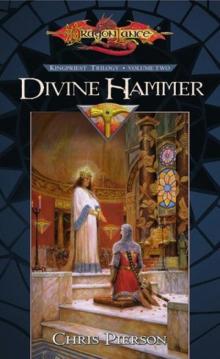 Divine Hammer
Divine Hammer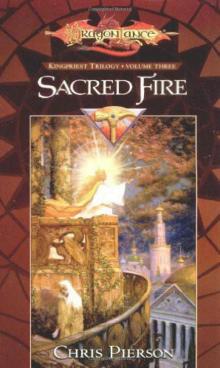 Sacred Fire
Sacred Fire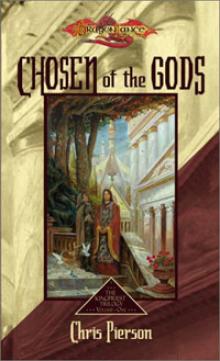 Chosen of the Gods k-1
Chosen of the Gods k-1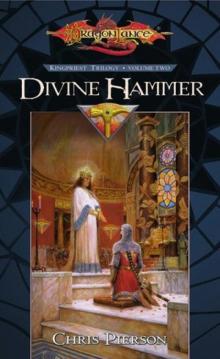 Divine Hammer k-2
Divine Hammer k-2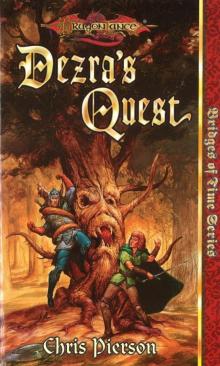 Dezra's Quest
Dezra's Quest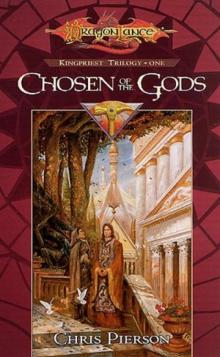 Chosen of the Gods
Chosen of the Gods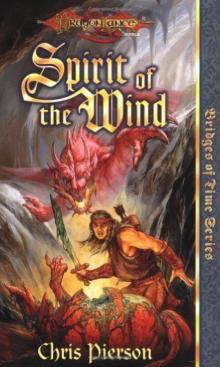 Spirit of the Wind bot-1
Spirit of the Wind bot-1